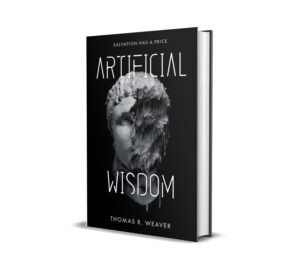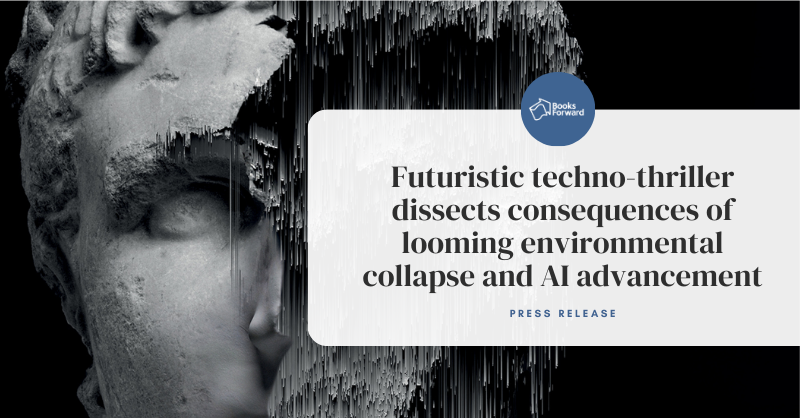Perfect for fans of Blake Crouch, Neal Stephenson, and RR Haywood
 London, United Kingdom – Successful startup and tech entrepreneur Thomas R. Weaver bursts onto the literary scene with his razor sharp and fast-paced debut, “Artificial Wisdom” (April 5th, 2024, Chainmaker Press). An enthralling murder mystery with a vividly realized future that grapples with the climate crisis, our relationship with artificial intelligence, and the lengths we’d go to to save the human race.
London, United Kingdom – Successful startup and tech entrepreneur Thomas R. Weaver bursts onto the literary scene with his razor sharp and fast-paced debut, “Artificial Wisdom” (April 5th, 2024, Chainmaker Press). An enthralling murder mystery with a vividly realized future that grapples with the climate crisis, our relationship with artificial intelligence, and the lengths we’d go to to save the human race.
In 2050, the earth’s climate is out of control. A heatwave has killed millions across the Persian Gulf, including the wife of journalist Marcus Tully. But he has a lead like no other: the heatwave was unnaturally diverted from hitting the USA thanks to geo-engineering.
The president who gave the order is now running for an even greater office: dictator of the nation states, with a short-term mandate to make the hard decisions the nations can’t in order to prevent a climate apocalypse. His final opponent is the world’s first AI politician, Solomon, governor of New Carthage, a floating, domed city-state protecting the elite. Solomon’s creator may have the evidence Tully needs to make his case to the world, but in the middle of the most important election in history, someone will do anything to stop the truth from coming out.
“Artificial Wisdom”
Thomas R. Weaver | April 5th, 2024 | Chainmaker Press
Techno-Thriller, Sci-Fi, Mystery
Print | 978-1-7394343-2-8 | $17.99
Praise for “Artificial Wisdom”
“A cracking read that’s full of twists, turns and thought-provoking ideas. It’s the best debut to cross my desk by a long way.”
–Mark Leggatt, McIlvanney Prize Longlisted Author of Penitent
“Artificial Wisdom is a jaw-dropping debut that feels like a blaring wake-up call for the audience to appreciate the potential dire consequences of climate change and Artificial Intelligence. At first both subject matters seem to have their own gravitas but it’s the brilliance with which Thomas R. Weaver has connected the two trending topics to create a narrative that may seem to be some decades into the future but whose seeds are very well planted as you read this review.”
–Best Thriller Books
“With a noir-ish style of writing – clipped, to the point, and immediately arresting — this takes a page-turning murder mystery into fresh territory, with a future-world fans of political sci-fi will be totally drawn into, and of-the-moment ethical issues everyone can relate to. Add to that a universal character journey of a man set on finding out why his wife died, and you have a sparky story that’ll satisfy a range of reading tastes.”
–LoveReading
About the Author

THOMAS R WEAVER writes stories about tomorrow to help make sense of today.
Aside from writing, Thomas is a UK-based tech entrepreneur. His last startup was acquired by Just Eat Takeaway; his new one is still in stealth but backed by a major Silicon Valley tech accelerator.
After successfully launching a tech startup in the restaurant hospitality space which transformed payment and ordering experiences he realized he had no more excuses not to do what he always wanted to do: write fiction. Despite swearing to friends and family (none of whom apparently believed him) that he’d never run another startup again, he recently started another one focussed on bringing some of the ideas in “Artificial Wisdom,” his debut novel, to life, specifically around communicating in augmented reality.
In Thomas’s spare time, he is an avid cook, and loves drawing, painting, and chess. He usually writes immediately after a workout and spa session down his local gym. Thomas collects more books than he has time to read, especially if they have beautiful covers, like Folio editions. He’s a sucker for great covers. Learn more about Thomas and his debut “Artificial Wisdom” at his website, here.
Follow Thomas R. Weaver on social media:
Facebook | Twitter | Instagram | TikTok | Threads
In an interview, Thomas R. Weaver can discuss:
- How elements of the book stem from his background as a successful tech entrepreneur
- Why he decided to write a techno-thriller about how the advancement of AI can influence our physical environment
- His passion for positive climate action and why he chose to make environmental collapse a key theme in his debut
- Why storytelling is critical for shaping how we think about species level risks like the climate and AI.
- How writing about a fictional future can shape reader’s imagination and inspire people to take action
An Interview with Thomas R. Weaver
1. You have a background in tech startups and entrepreneurship, tell us a bit more about your career and how it has informed the premise of your book.
Despite having a computer science degree, I ignored tech for most of my early career. When I graduated, a degree like mine in the UK meant working in middle management at Microsoft. But I always wanted to run my own business. And technology is a great way of building something people want, and scaling it. My first tech startup was in hospitality, and we eventually sold it to a food delivery giant.
I spent a lot of time thinking and talking about technology to people in the industry, and one of my passions was helping them understand what was happening in technology five years out and how it might transform their businesses. In a way, that’s the key bit that translated into writing a techno thriller in a way that isn’t off putting, and that people can visualise, because I focus on the impact it has on the character’s lives, not how the tech works itself.
2. The idea that artificial intelligence might become autonomous can be an anxiety-inducing topic. Why did you choose to explore this in “Artificial Wisdom?”
It’s time to stop thinking of it as the Terminator and time to think about how we can use it safely. The evolution of Artificial Intelligence is no longer on a linear growth curve, but an exponential one. We’ve enough evidence now to take AI seriously, and enough time to make sure it is safe for humanity, and figure out how to harness it to solve the greatest issues of our time. The purpose of good sci-fi is to explore the best and worst cases of exactly these kinds of questions.
3. Why did you choose to write a novel where some of our worst fears about environmental collapse are vividly imagined?
After selling my company in 2019, I finally found I had time to think, after the stresses and strains of dealing with a startup. Unfortunately, when you have time to think, you start to worry about the future. I started to read and research more about the climate, and as so many people do, felt impotent against the magnitude of the crisis we face. Covid only magnified this worry, as we coped with the urgency of it so poorly. Writing this was, in some ways, therapy for me to get my biggest concerns down on the page, and show what would happen if we didn’t take it seriously.
4. What do you hope readers will take away from reading “Artificial Wisdom?”
I’m not aiming to come in heavy with a big message here. Although I hope there’s a lot to make people think (and I wouldn’t want to spoil that). More, I’m hoping that readers are entertained, that they love the world I’ve crafted for them, and hopefully that they have some very sleepless nights where they can’t put the book down, and curse my very name the next day.
5. What’s next for you as an author? Are you working on anything new, and if so, can you tell us a bit about it?
I’m currently finishing off a new sci-fi mystery-thriller with a very noir vibe to it, called Futilitytown. It will be my next book and a standalone, but launch a new series. And by popular demand I’m writing a sequel to Artificial Wisdom. Though I see it as a duology and definitely not a series.
Download press kit and photos

A former award-winning journalist with national exposure, Marissa now oversees the day-to-day operation of the Books Forward author branding and book marketing firm, along with our indie publishing support sister company Books Fluent.
Born and bred in Louisiana, currently living in New Orleans, she has lived and developed a strong base for our company and authors in Chicago and Nashville. Her journalism work has appeared in USA Today, National Geographic and other major publications. She is now interviewed by media on best practices for book marketing.


